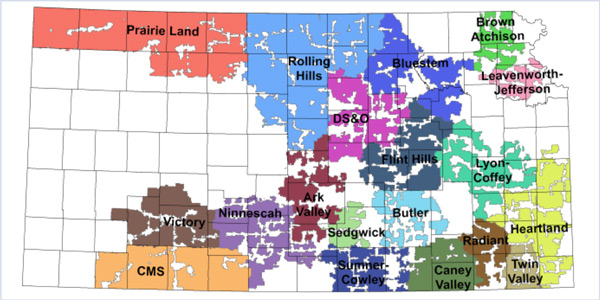By Rich Heidorn Jr.
FERC last week issued rulings in three SPP transmission cases, mostly siding with the RTO but rejecting its proposal to change the conditions for classifying service upgrade costs for designated resources.
SPP’s Tariff allows service upgrades associated with new or changed designated resources to be classified as base plan upgrades, subject to regional cost allocation, if the load-serving entity’s resulting capacity does not exceed 125% of its projected system peak responsibility.
SPP said its proposed wording changes clarify and update its rules and have “no practical or detrimental effect” on its study process.
The commission disagreed, saying the proposed Tariff language was inconsistent with SPP’s representation of how it calculates customers’ “highest hourly load” (ER17-1795).
It also took issue with the RTO’s plan to calculate “highest hourly load” on an aggregate basis for network customers with multiple service agreements that include the same designated resources. The commission said SPP had not proven that its proposal was not unduly discriminatory to customers with multiple agreements that do not include the same designated resources.
Z2 Waiver Upheld
The commission denied rehearing requests on its July 2016 order waiving the one-year limit for adjusting payment obligations and revenue distributions for transmission projects under Tariff Attachment Z2. (See SPP MOPC Recommends 5-Year Timetable for Resolving $849M Z2 Bill.)
FERC said the challengers — American Electric Power, Xcel Energy, Kansas Electric Power Cooperative (KEPCo) and Southern Co. — incorrectly applied the commission’s criteria for granting waivers (ER16-1341-001).
“Specifically, the arguments made on rehearing conflate the waiver’s scope (i.e., the provisions to be waived) with its potential consequences,” FERC said. “The parties on rehearing also ignore the waiver’s purpose because they assert that SPP must demonstrate that it will implement the crediting mechanism correctly before the waiver can be granted. The purpose of the waiver is to remove barriers to implementation. The process of implementation itself is beyond the scope of this proceeding.”
Split Decision in KEPCo Dispute
The commission partially granted KEPCo’s November 2016 complaint in a separate transmission dispute with SPP (EL17-21). The commission also denied some claims and set settlement judge procedures on others.
FERC rejected KEPCo’s allegation that SPP inappropriately directly assigned the cooperative $6.2 million in costs for network upgrades in violation of four network integration transmission service (NITS) agreements and the filed rate doctrine.
“Even though the NITS agreements did not list any network upgrades for which KEPCo would be directly assigned cost responsibility, KEPCo knew that … there may be possible Attachment Z2 revenue credit payment obligations and also that SPP was in the process of developing the [Crediting Process Task Force] white paper, with a methodology that would identify the network upgrades with more certainty,” the commission said.
FERC also rejected KEPCo’s claim that SPP’s allocation of upgrade costs was made too late under its Tariff. “To the extent SPP’s original analysis did not capture certain creditable upgrades, we also find it is reasonable to permit SPP to make corrections to the list of network upgrades so that upgrade sponsors are compensated for transmission service that their sponsored upgrades have facilitated, and which KEPCo has received,” it said.
SPP also prevailed on KEPCo’s claim that it violated the “but for” test in directly assigning costs for certain network upgrades.
The commission agreed with KEPCo that SPP had “improperly applied” its cost allocation rules in one instance but said the violation had no impact on the costs allocated to the cooperative.
Finally, FERC set hearing and settlement judge procedures to resolve whether KEPCo’s transmission service requests had a material impact on the Rice-Circle transmission project — a new Rice substation and an upgrade of the 28-mile line between it and the Circle substation to 230 kV from 115 kV.
“The specific issue is whether, according to a transfer distribution analysis, KEPCo’s transmission service requests cause at least a 3% impact on the Rice-Circle facility, and therefore, are considered to impact the facility and should be assigned costs for that facility,” the commission said.
— Tom Kleckner contributed to this article.





